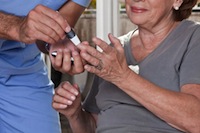Invokana, and other drugs in the class (Jardiance, Farxiga, Invokamet, etc.), have been linked with a host of side-effects, including diabetic ketoacidosis, kidney failure, an increased risk of lower limb amputation, and most recently, severe infection. On August 29, 2018, the FDA announced that all SGLT2 inhibitors would carry a warning for a rare, but potentially life-threatening infection called necrotizing fasciitis of the perineum, also known as Fournier’s gangrene. Other types of severe infection have been linked to SLGT2 inhibitors, including Invokana, such as genital mycotic infection, bladder infection, and kidney infection.
What is an SGLT2 Inhibitor?
 SGLT2 inhibitors are prescription medications that are supposed to help lower blood sugar in adults with type 2 diabetes. SGLT2 is short for sodium-glucose co-transporter-2. These medications are approved by the Food & Drug Administration to lower blood sugar by causing the kidneys to remove sugar from the body through the urine. The currently available SGLT2 inhibitors include:
SGLT2 inhibitors are prescription medications that are supposed to help lower blood sugar in adults with type 2 diabetes. SGLT2 is short for sodium-glucose co-transporter-2. These medications are approved by the Food & Drug Administration to lower blood sugar by causing the kidneys to remove sugar from the body through the urine. The currently available SGLT2 inhibitors include:
- Invokana (canagliflozin);
- Invokamet (canagliflozin and metformin);
- Jardiance (empagliflozin);
- Xigduo XR (dapagliflozin and metformin);
- Farxiga (dapagliflozin); and
- Glyxambi (empagliflozin and linagliptin).
What’s wrong with these drugs?
According to FDA Adverse Event Reports, use of SGLT2 inhibitors for diabetes has been associated with patients developing diabetic ketoacidosis, or too much acid in the blood. The FDA issued a Drug Safety Communication warning diabetes patients using SGLT2 inhibitors to watch for signs of ketoacidosis such as difficulty breathing, nausea, vomiting, abdominal pain, confusion, and unusual fatigue or sleepiness. The warning was issued after 20 cases of ketoacidosis were identified in the FDA’s Database of Adverse Events related to the use of diabetes medications known as SGLT2 inhibitors such as Invokana and Invokamet.
An update to that communication indicates that severe infections might develop as a result of that ketoacidosis. Reports show that several patients taking SGLT2 inhibitors contracted urinary tract infections which then progressed to become life-threatening blood infections (urosepsis) as well as infections of the kidneys (pyelonephritis). At least one study suggests that genital mycotic infections resulting in the need for circumcision may be related to the use of Invokana.
In addition, we have spoken with experts who are concerned that Invokana may cause kidney failure. Because these drugs use the kidneys to lower blood sugar, they put extra stress on the kidneys, can increase the risk of kidney failure.
The FDA as also issued an alert about bone fractures and bone loss. Specifically patients taking 300mg of Invokana were nearly 50% more likely to suffer a fracture, with some fractures occurring as early as 12 weeks after the start of treatment. Hip bone density declined by as much as 1.2% over two years. A clinical trial also measured reduced femoral neck bone density.
What is diabetic ketoacidosis?
 Diabetic ketoacidosis can be life threatening. The condition occurs when the body’s cells are unable to get the sugar they need for energy. Starved of those vital sugars, the body then begins to break down fat and muscle for energy instead and releases ketones into the blood.
Diabetic ketoacidosis can be life threatening. The condition occurs when the body’s cells are unable to get the sugar they need for energy. Starved of those vital sugars, the body then begins to break down fat and muscle for energy instead and releases ketones into the blood.
The release of ketones into the blood results in too much acid in the blood: a chemical imbalance known as ketoacidosis. Diabetic ketoacidosis may require hospitalization for treatment and can result in diabetic coma, brain swelling, or death.
